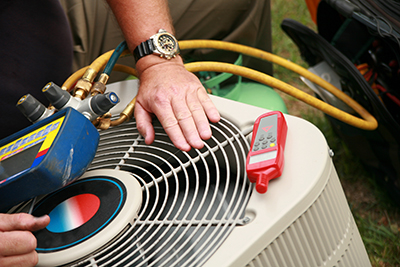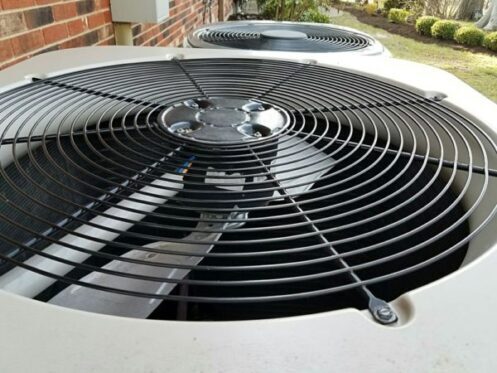Updated: January 2024
Your HVAC system is one of the major investments you’ll make for your home, right up there with a roof. Depending on how long you live in your home, you may have to replace all or part of it more than once. As such, it’s helpful to know how long you should plan on it lasting so that you can budget for the replacement over time. Discover what’s included in your HVAC system, what affects its service life, and how long it should last.
What’s an HVAC System?
When we talk about the HVAC system, do you think about your air conditioning or possibly your heater? The reality is that your HVAC goes well beyond just those two components.
HVAC stands for heating, ventilation, and air conditioning. This does include your AC and heater but also the ducts in your home, your thermostat, and the devices that keep fresh air coming into your home, known as ventilation.
However, when we talk about how long an HVAC system lasts, we’re generally talking about the components involved in keeping the temperature in your home comfortable. At a high level, your HVAC system should generally last 15-20 years. However, that’s an oversimplification because different components have different expected service lives. Additionally, there are some variables that can shorten your service life.
Even if your system appears to continue running strongly after that 15-20 year range, it may be time for a replacement. HVAC technology improves over time, sometimes because of mandated minimum efficiency standards. That means that after 15 or 20 years, the models on the market are likely to have a higher efficiency than your current model, allowing you to pay less to heat and cool your home when you upgrade.
Effect of Maintenance on Service Life
Several things happen as your system runs that add operational strain. First, mounting hardware and electrical connections loosen due to the vibration created within the system. Second, airborne particles make their way into your system. The air filter catches some while smaller particles settle further into the system. These cause less airflow through the system, leading it to run abnormally long heating and cooling cycles.

Whether we’re talking about an additional electrical strain on your system or the fact that it simply runs longer cycles, the result is excessive wear. This translates to more frequent repairs and a shorter service life.
Additionally, running an improperly sized system will shorten its service life as well. This happens because of the strain created by short cycling in oversized systems or because of long cycles in undersized ones.
How Usage Habits Effect Service Life
In addition to your system’s maintenance, how you use your system will affect how long it lasts. For both heating and air conditioning, using a programmable thermostat helps reduce the wear it experiences. If you consider that most homes sit empty for anywhere between 8-15 hours each day, that means you’re putting wear on your system by leaving it set to your comfortable temperature while you’re gone. A programmable thermostat allows you to automatically change the temperature settings while you’re not home, reducing the system’s wear.
Additionally, your thermostat setting also affects how much wear your system experiences. The greater the difference between the set temperature and the air temperature outside, the more work your system has to do.
This is especially true for your air conditioner or a heat pump that relies on the temperature difference between the coil outside and the outdoor air temperature. Once that difference exceeds 20 degrees, you start losing efficiency and adding wear to your system.
How Long Should Air Conditioners and Heat Pumps Last?
Air conditioners and heat pumps are very similar in how they work. Both use refrigerants to transfer heat. In fact, the most significant difference between the two is the reversing valve that allows a heat pump to heat as well as cool. The average central air conditioner has an expected service life of anywhere from 10 to 15 years.
Heat pumps, on the other hand, have a slightly shorter service life being they pull double duty and run year-round rather than getting a break over the winter. That said, they tend to last anywhere from about 7-12 years, depending on how you use it.
How Long Should a Furnace Last?
If you happen to have a furnace to heat your home when the temperatures become a little cooler, you can expect a service life of about 15 to 20 years. If the temperatures don’t get cold enough to run a furnace often, you’ll likely have no problem getting your furnace to last this entire time. Just keep in mind the improvements in efficiency over time, and consider upgrading your furnace.
Do Thermostats and Air Ducts Wear Out?
Two often forgotten parts of your HVAC system are your thermostat and air ducts. Without both of these working properly, your system won’t effectively heat or cool your home.
Thermostats tend to have a service life about the same as air conditioners, usually 10 to 15 years. Whether you have an old mercury switch thermometer or a newer digital model, they eventually stop working accurately. In both cases, they stop registering the temperature accurately. This leads to your system cycling at unusual times and possibly running longer or shorter cycles than it should.
Likewise, your air ducts also have an expected service life of 10 to 15 years. After that, they tend to develop leaks that reduce your system’s efficiency. The way to ensure they last their entire service life is to have them professionally sealed and insulated.
Knowing When It’s Time to Replace Your System
There are a few ways to know when it’s time to replace your system. First, keep an eye on its age, and plan to replace it before it starts giving you major problems. This ensures you never pay more for your heating and cooling than absolutely necessary. It also prevents you from having to rush to replace your system because it suddenly fails.
Next, keep an eye on your repair and utility bills. Both tend to go up as your system ages. For your utilities, make sure you’re looking at your consumption each month compared to the year prior. For the repairs, multiply your annual repair expenses by the age of your unit. When that exceeds the cost of a new system, it’s time to replace your system.
When you need help keeping your family comfortable, trust the professional team that residents around Canyon Country have turned to for over 25 years. The expert and licensed technicians at Affordable Air & Heating provide heating and air conditioning installation, maintenance, and repair services together with indoor air quality solutions. Call to schedule your air conditioner or heating consultation with one of our friendly technicians today.
Call Affordable Air & Heating today!




